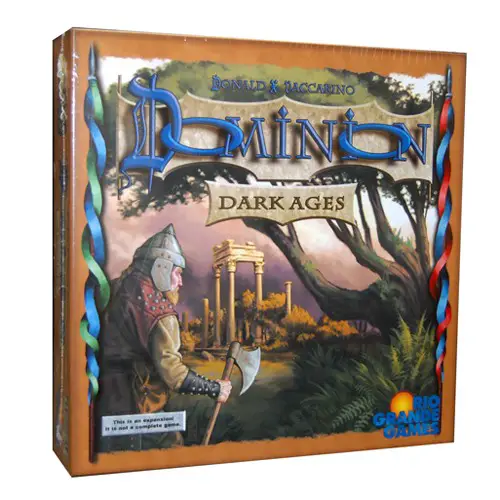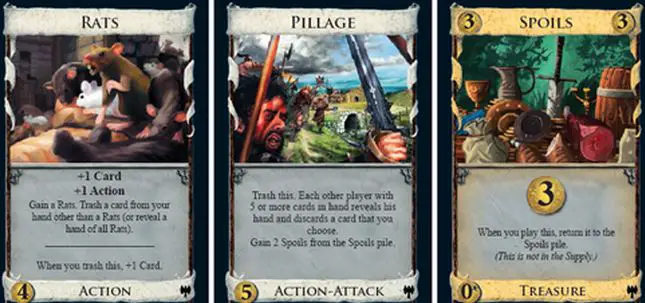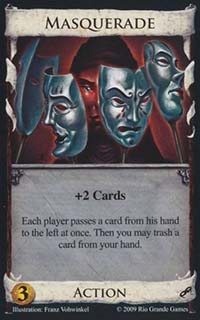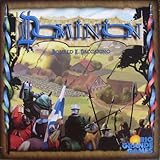
Dark Ages includes three Shelters - Hovel, Necropolis, and Overgrown Estate. These cards replace starting Estates in some games, as described under Preparation. Shelters have no corresponding Supply pile; they can never be bought, and Ambassador (from Seaside) cannot return one anywhere.
Card Piles
Dark Ages has two piles of cards that have a variety of cards in them: the Ruins pile has a mix of five different Ruins, and the Knights pile has ten different Knights. These piles should be shuffled before each game, as explained under Preparation.
The only card that may be bought or gained or chosen from one of these piles is the card on top. Players cannot look through the piles, only at the top card; the players turn the top card over any time it is face down.

If a card is returned to one of these piles with Ambassador (from Seaside), turn over the current top card and the returned card goes on top, turned face-up. Ruins cards with different names, and Knights with different names, count as differently named cards for cards that care about this.
For example if Tribute (from Intrigue) reveals two different Ruins cards, it will give +4 Actions. When Contraband (from Prosperity) is played, a player can name a Ruins or Knight, but that only stops that specific Ruins or Knight from being bought. However an Embargo token (from Seaside) placed on the Ruins or Knight pile will affect any cards bought from it.
Ruins
Players can buy Ruins even though they normally will not wish to. Ruins cards are Actions; they may be played in the Action phase, and count as Actions for things that refer to Action cards, such as Procession. The Ruins pile, when used, is in the Supply, and if it is empty that counts towards the normal end condition.
Cards

Cards that try to get specific cards from the Supply fail to get a Ruins or Knight if the correct one is not the top one.
For example if you buy a Ruined Market with Talisman (from Prosperity), you only gain another Ruined Market if that is the top Ruins under the one you bought; if you use Ambassador (from Seaside) to return Sir Martin to the Supply, the next player will gain that Sir Martin, but the player after that will not gain a card, as the next Knight will not be Sir Martin.
Card Abilities
Many cards in Dark Ages do something "when you trash" that card. These abilities function no matter whose turn the card is trashed on. The player that a "when you trash this" ability functions for is the player that had that card, regardless of whose card trashed the card.
These abilities happen directly after the card is put into the trash, and can function in the middle of resolving effects for an Action card; for example, if a player plays Graverobber and uses it to trash a Cultist, he first draws three cards for trashing Cultist, then continues with resolving Graverobber and gains a card costing up to  .
.

Cards can sometimes leave a player's deck without being trashed, such as by being returned to the Supply with Ambassador (from Seaside) or passed to another player with Masquerade (from Intrigue).
When two or more cards are trashed at the same time, as with Count, first trash them all, then pick an order to resolve things that happen due to trashing them. A "when you trash" ability is not itself a way to trash a card; some other card will be needed to actually trash the card and make the ability happen.
Six cards in Dark Ages are never part of the Supply: Spoils, Madman, Mercenary, and the three Shelters: Hovel, Necropolis, and Overgrown Estate. Keep these cards handy for when they are needed. These cards cannot be bought, and cannot be gained by cards that gain cards from the Supply, such as Armory. They cannot be returned to the Supply with Ambassador (from Seaside).
They can end up in the trash if something trashes them. These piles being empty does not count towards the end condition for the game, or towards the count of empty piles for City (from Prosperity).
Continue Reading


